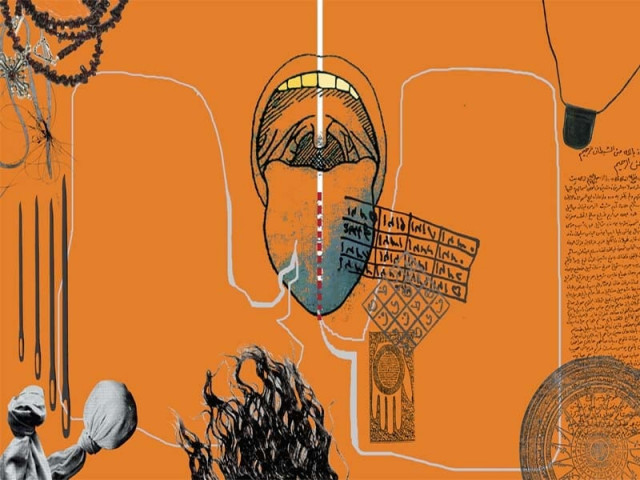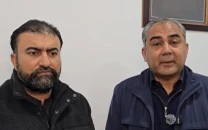Aamils, astaanas and amulets
The ‘Ustad’ refers to his work as ‘fakeeri’ and does not charge for his services.

Aamils, astaanas and amulets
The people who come here seek a consultation with the resident aamil, a man trained in the art of the supernatural, a man they believe can solve their problems, and perhaps even give an insight into what the future holds for them. Despite the image that the word ‘aamil’ conjures up, he is not an unkempt man with unruly hair, a long beard and rosaries hanging around his neck in the dozens. He is a tall, lean young Baloch with a clean-shaven face. In his neatly pressed shalwar kameez, he easily blends in with the throngs in the courtyard — apart from the fact that he is followed by his retinue, and a hum of awed whispers accompanies his appearance.
The ‘Ustad’ as he is called by his clients and followers, refers to his work as ‘fakeeri’ and does not charge for his services. He says he became a Hafiz-e-Quran at an early age, and performed an immense amount of ibadat and sacrifice in his quest to gain spiritual powers. But his journey took him to a darker path when his teacher, a Bengali Aamil, also taught him the basics of black magic. The lure of the dark arts proved too seductive to ignore. “For a few months, I read the Quran backwards in order to please Satan. But then, through the guidance of my father and another aamil, I realised how wrong that was. I swore that I would never practice black magic again,” he says.
Most of the people waiting here at the astaana are women. They sit patiently on the cool marble floor, swapping stories as they wait their turn.
Requiring very little prompting, an old woman from Orangi Town eagerly talks about how relieved she is at having found the Ustad. She had been worried about her grown daughter who was unable to get a decent marriage proposal, and has been visiting the Ustad regularly for the past two months so that he can lift the ‘curse’ from her daughter. Although she still isn’t married, the woman swears she feels things have taken a turn for the better. She’s not alone in her faith; a group of Iranian women sitting nearby narrate how they had arrived here after unsuccessfully visiting many other places for a cure for their sister’s illness. An illness they too believe was caused by black magic.
Shepherding the crowd and encouraging people to form queues and wait their turn is the owner of a leading nihari restaurant chain in Karachi. He claims that he has been helped on many occasions by the Ustad, so he now devotes his free time to the astaana, as a gesture of his gratitude to the Ustad.
Not everyone here is looking for something as dramatic as a ‘cure’ for black magic. There are many who seek the advice of their aamil for everything from naming a child or whether or not to accept a marriage proposal. For these people, the weight of his word is often greater than that of friends and family.
Aziz Ahmed is a 35-year-old factory worker and resident of Manghopir. He and others in his locality wholeheartedly believe that the supernatural plays a major role in their lives. ‘Amal’ is rooted in their culture and they consult aamils for a wide array of problems: physical ailments, marital discord and family feuds. Without the help of an aamil, it is difficult for them to resolve even the simplest issues and they eagerly relate the ‘miracles’ that have been worked by their spiritual advisors. Ahmed recounts how somebody took away the keys to his motorcycle and, no matter where he looked or who he asked, he couldn’t find them. “I went to my aamil who told me that I would find the keys next to my bike the next day, and I did,” he says.
Aamils are not the only ones who are thought to possess the power to make sense of people’s lives, decipher the hidden meanings behind events and provide spiritual help. Ahmed estimates that approximately while 80% of the people in his locality go to aamils — the rest go to ‘black magicians’.
These practitioners of the dark arts are assumed to be more powerful than aamils; they not only assist people with their own problems, but claim to go a step further by enabling them to cause changes in other people’s lives — usually for the worse. These could range from ruining someone’s marriage prospects to casting a spell to make another person fall ill.
Just as in any belief system, there is method to the madness. To cast their spells, black magicians need to collect tokens such as a person’s hair, nails, blood or clothes — in essence, anything which is of that person, or has been touched by or rubbed against him. Using these items, concoctions, potions, and charms are prepared. For the spell to take effect, the charms are burnt or placed near the person. Often, the magicians claim to use the services of evil jinns and spirits in placing cursed objects like nails, amulets, and dead animals inside people’s homes. Potions have to either be ingested or directly applied in order to be effective. These magicians also cast spells by chanting, writing spells, making pictures and dummies of the victim, tying knots and blowing on them, and burying cursed objects in particular places.
Paradoxically, these black magicians are also thought to be the only ones who can break the powerful spells that they cast, and when people believe that they are under the influence of such a spell, many turn to the same black magicians for a remedy.
Others may seek out someone like Maulana Abdul Khaliq, an imam and aalim (see: Aalim vs. Aamil) from Bahawalpur who guides people in the cure and reversal of magic spells. He strongly disagrees with the belief that only black magic can counter black magic. “Can dirt ever clean dirt?” he asks. “Only something pure and clean can break the spell. A person going to a black magician for a cure is as bad as the one going to him for the spell itself.”
And they don’t call them ‘black’ magicians for nothing. Maulana Mushtaq, is a self-proclaimed expert of Noori Amal (See What Is Noori Amal) and claims to have been helping people break evil spells for many years now. He sits everyday for three hours at his astaana in Karachi’s Defence neighbourhood to treat people’s problems with the help of the Jinns he claims to have under his control and through the recitation of Quranic verses.
According to him, black magicians are required to indulge in unspeakable acts and commit cardinal sins in order to increase their powers. And he should know, given that one of his oldest friends is a black magician based in the Sindhi town of Badin. “When his father was dying,” says Mushtaq, “he transferred his powers to his son. Since then, he has augmented his powers by undertaking grotesque rituals and incantations. Just as we aamils use good spirits and Jinns to help us in our work, he takes the help of evil spirits. He is now a well known magician in Badin and comes to Karachi every month to meet his clients here. The payments for his services are in the millions of rupees,” says the Maulana.
Shujauddin Shaikh, Director Academics of the Quran Academy is equally clear that black magic is a thing of the devil. “Practitioners of black magic gain power by singing the praises of the Shayateen (devils), reciting formulas of a heretical nature, and by denying Allah or associating others with Him,” he says. “They also indulge in evils like preparing charms with the blood of a person who has been killed unlawfully, and they themselves live in a constant and deliberate state of filth and impurity.”
For the believing Muslim, there are sound grounds for believing in magic. Religion and magic seem to overlap in many places with the Quran itself making references to magic. Believers are also guided to recite certain surahs if they believe an enchantment has been performed on them. For that matter, both Christianity and Hinduism also acknowledge the existence of the supernatural and the existence of those who are able to manipulate that invisible world.
According to Shaikh, magic is unconditionally and absolutely prohibited in Islam. “It is haram to learn, teach and perform magic or indulge in soothsaying for any cause whatsoever,” he says. He also recommends that if the need should arise, people should go to an ‘aalim’ — who will guide them according to the Quran and Sunnah — and not an ‘aamil’. Paradoxically, though, these prohibitions only serve to strengthen people’s belief in the power of magic, and make them more likely to turn to its practitioners when they believe they have been cast a spell on. After all, they argue, if it doesn’t exist, then why was it prohibited? (See Magic and Superstition: An Islamic Perspective)
Nor is belief in magic the exclusive preserve of the uneducated, and even sceptics have been known to become fervent believers. Saleem Haider is an educated businessman who never harboured superstitious beliefs and was content with the profits he was earning. But when he started making consecutive losses, his relatives suggested that his foes had put a magic curse on him. Haider paid no heed, but he had to comply when his wife brought him a ‘taveez’ (amulet) from an aamil and demanded he wear it. “I don’t know whether it was the taveez or my luck, but from then on things started getting back on track,” he chuckles.
Farida Zahoor, a doctor by profession belongs to a highly educated and non-superstitious family with no history of going to soothsayers. Some time back, while tending to his garden, her brother-in-law was digging a neglected flower bed when he and the gardener unearthed a half-decayed goat’s head. The disconcerted family members quickly made a connection between the discovery and the financial problems and illnesses they had been experiencing for some time — all of these now seemed the result of black magic. Still, unsure of what to do, they threw away the goat’s head. Soon after this unsettling episode, Farida’s mother-in-law took a turn for the worse and passed away. Next, her brother-in-law started having heart problems. Convinced that evil spells were at the root of all their troubles, the family went to an aamil in Mauripur. A homeopathic doctor by profession, the aamil told them that there were more amulets hidden in their house. After many payments for cleansing rituals, the family felt that things were getting back on track. “This incident has completely changed my brother-in-law. Now he suspects magic behind every minor happening and keeps lamenting about the experiences we’ve been through, without being able to move on,” says Farida.
Visit the ‘offices’of any local aamil and you will see hordes of women standing in cramped corridors, ready to hand over whatever amount of money that the aamil demands. Many aamils also ask for roosters and goats, ostensibly to help them perform the magic. And the women, who want to protect their families from the black magic that they think has been performed on them, are more than willing to comply with their demands. Still, the protection that they buy is often questionable, since they have no means of ascertaining whether a given aamil is genuine or not. Indeed, it is hard to tell what exactly one means when one talks of a ‘genuine aamil’. Disappointed with the advice and effectiveness of one aamil, a client may turn to another, who will discredit the former aamil further, casting doubts on his work. There is no way to verify whether it is the spells and amulets that have brought about changes, and sometimes a good bedside manner is all that is really needed to keep a client satisfied.
Ahmed recounts how one of his close friends, whom we’ll call Farid, always had the gift of the gab and a keen sense of observation but wasn’t particularly successful in finding a job. One day he simply packed up and shifted to a new locality where no one knew him. Without any knowledge of spiritual matters, he opened an astaana and presented himself as a powerful aamil. He was able to get many clients until an influential family came to him for help. The mental health of their son had greatly deteriorated, and they believed it was the result of a curse. The fake aamil demanded Rs30,000 and guaranteed that the patient would be fine in a few days. But the deception could not last long, and when the family discovered that they had been duped, they beat him up badly and left his reputation in tatters.
There are many conmen like Farid out there, busily scamming the gullible. Shazia, a 30-year-old resident of PECHS has been a victim of these spiritual swindlers. A year after her marriage, her life became a living nightmare. She believed that someone put a curse on her husband, which destroyed his once-prospering career. Despite being highly educated and experienced in his field, he was rejected everywhere he applied. The couple started falling sick frequently and medicines had no effect on them. “I wouldn’t be able to recite the Quran or pray, as every time I did, something terrible would happen to us,” she recalls with a quivering voice.
She sought the help of a practitioner of the dark arts who charged her Rs70,000 but only ended up making matters worse. This wasn’t the only time she was tricked. In her effort to break the effects of the enchantment, she suffered at the hands of numerous charlatans. Finally, she found a religious scholar who advised her to resume her prayers. He then guided her through certain duas and helped her regain her peace of mind. For all of this, he didn’t charge a dime.
A twisted perception of reality is common in those who believe they have been the victims of black magic. The belief can cause psychosomatic disorder (condition in which psychological stresses adversely affect physiological functioning) and somatoform disorders (psychiatric disorders that cause unexplained physical symptoms) so that the person exhibits physiological effects along with hypertension, migraines, hysterical outbursts and hallucinations. According to Ms Rubina Feroz, Psychologist and Head of the Department of Psychology at Karachi University, “If a person has a staunch belief in magic and its power, the very thought of being under a spell can have disastrous effect on him.” Of course, the reverse is also true she adds, saying “since their belief in their spiritual healers is so strong, when they go to their soothsayers, it has a placebo effect on them and they feel healed.”
Published in The Express Tribune, Sunday Magazine, September 25th, 2011.


















COMMENTS
Comments are moderated and generally will be posted if they are on-topic and not abusive.
For more information, please see our Comments FAQ